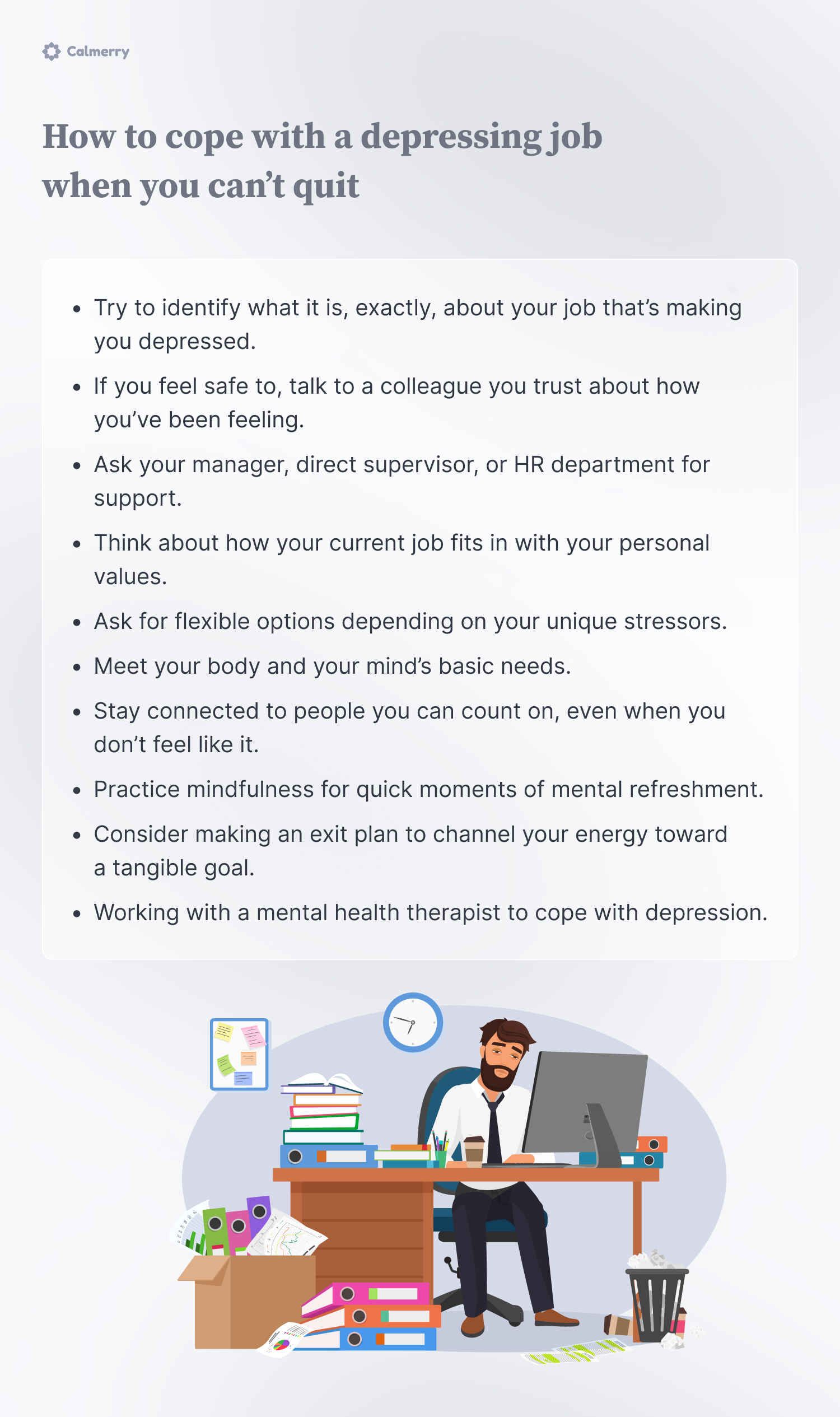“My Job Is Making Me Depressed, but I Can’t Quit” – What to Do

In this article
It’s common to experience job-related stress or to even hate your job. But what do you do when that unhappiness and burnout becomes something more serious: depression?
In a 2023 survey by Mental Health America, over 81% of respondents said that workplace stress negatively affects their mental health. [1] 2023 workplace wellness research. (n.d.). Mental Health America. https://www.mhanational.org/2023-workplace-wellness-research Another survey showed that almost a fourth of American workers experience depression. [2] Workplace Mental Health – Survey of U.S. Workers Reveals Impact on Productivity from Depression. (n.d.). https://workplacementalhealth.org/survey-of-u-s-workers-reveals-impact-on-productivi
Depression is a mental health condition that causes a low, sad, or empty mood, fatigue, and a lack of interest in the world around you. Many different things can contribute to depression, and high stress at work can be one of those factors.
In this article, we’ll talk about how you can cope when your job is making you depressed and you can’t quit. We’ll also provide some tips for workplace leaders when navigating delicate conversations with employees who may be depressed.
How do you cope with a depressing job when you can’t quit?

One way to cope with a job that’s causing depression is to quit the job to prioritize your mental health. Although this is an ideal solution, unfortunately – in reality – few people can make this choice.
This might leave you feeling stuck – you know your job is contributing to depression, but you’re not logistically or financially able to leave.
This is a challenging situation for anyone to be in. But there are ways to cope if your job is making you depressed that don’t involve quitting. Here are 10 tips.
1. Identify specific stressors
Try to identify what it is, exactly, about your job that’s making you depressed. This can make it easier to figure out a way forward.
For example, is it a toxic manager that’s making you depressed? The long commute? Is it the fact that your job doesn’t bring meaning to your life?
Some stressors are more within your control than others, and there may be certain factors that you won’t be able to change. But identifying what’s contributing to depression can be the first step in making a plan. What would need to change in the workplace for it to not be so depressing?
Some other common depression triggers in the workplace include:
- Lack of autonomy
- Poor work-life balance
- Compassion fatigue
- Unclear job expectations
- Poor interpersonal relationships with colleagues
- Bullying or harassment
- Limited advancement opportunities
- Inadequate pay
- Lack of recognition
- Lack of purpose and meaning
2. Get support from coworkers
How do your coworkers feel about the job? Could any of them be facing depression as well? Others sharing your experience of depression won’t make your feelings go away. However, it can provide you with a sense of solidarity, camaraderie, and support.
If you feel safe to, talk to a colleague you trust about how you’ve been feeling. Just having someone to share your feelings with can help alleviate some stress. In addition, colleagues can sometimes help with specific tasks that are causing you stress and depression.
– Saya Des Marais, MSW, Therapist-turned-mental health writer
If conflict with your colleagues is contributing to your depression, work on addressing this as soon as you can if it’s possible to do so. Research has shown that interpersonal conflict at work contributes to poor mental health, including depression symptoms.
3. Talk to your supervisor
In addition to your colleagues, your manager, direct supervisor, or HR department may also be able to provide support. People in positions of power can refer you to treatment resources to manage depression, talk to you about possible accommodations (like taking time off for mental health), and more.
There is no guarantee that your managers will be able to provide you with what you need, but asking for support can open the conversation.
However, deciding whether or not to share your depression symptoms with management is a personal decision, and it’s understandable to be nervous about it.
Recent reports have shown that less than 20% of American employees feel comfortable talking about mental health with senior leadership at work. [3] Wong, B. (2023, October 10). The future of mental health at work is safety, community, and a healthy organizational culture. Harvard Business Review. https://hbr.org/the-future-of-mental-health-at-work-is-safety-community Many people are worried that they’ll be discriminated against if they disclose they live with depression – and unfortunately, this is an all-too-valid worry in some workplaces.
But if you have a great supervisor who you trust, then getting their support could be critical.
4. Evaluate your personal values
Often, jobs become depressing because they bring no meaning to your life. Purpose, or feeling like your life has meaning, is an important human need. Although the workplace isn’t the only place you can find purpose in your life, most of us spend so much time there that it can be depressing if your job feels meaningless to you.
Ideally, everyone could switch careers to something they find more meaningful. But even if you can’t quit your job, that doesn’t mean that all hope is lost.
Take a good look at your values – the things that are most important to you in life. Some common values include family, integrity, and respect. Then, think about how your current job fits in with those values. If this isn’t obvious right away, try looking deeper.
For example, perhaps your job allows you to support your family financially, which aligns with your value of family. Perhaps your values align with the mission of the company, even if your daily tasks don’t bring you meaning or gratification.
If you’re able to tie your values into your job in some way, then it may help you feel less depressed about it.
– Saya Des Marais, MSW, Therapist-turned-mental health writer
5. Explore flexible options
Some jobs offer flexible working options. For example, they may offer a “flex-time” schedule where you are permitted to take time off and make it up later or a hybrid-remote set-up where you can work part-time from home.
While these options probably won’t entirely “cure” your work-related depression, they can be helpful to take advantage of depending on your unique stressors. For example, if you’ve identified that poor work-life balance or a long commute are factors contributing to your depression, then a flexible schedule may alleviate some of the pressure.
Schedule a time to talk with your manager or the HR department about what flexible work options may be available to you.
6. Develop a self-care routine
The internet tends to oversell self-care as the ultimate remedy to all challenges. Sometimes, people get frustrated by this advice. No self-care routine can magically fix a depressing job. Self-care isn’t a cure-all solution for workplace difficulties.
At the same time, it’s crucial not to dismiss the basics of self-care. Self-care isn’t about lighting candles or going to the spa. It’s about meeting your body and your mind’s basic needs. Things like ensuring you get enough sleep every night, eating enough nourishing meals, and finding outlets for creativity are essential to maintaining mental well-being.
Building a self-care routine won’t miraculously transform your job; it can, however, act as a buffer against its toll on your mental state. Sometimes, the small yet consistent acts, like prioritizing a good night’s sleep, can be the most impactful strategies for coping with work-related depression.
7. Don’t isolate yourself
One of the reasons why people experience work-related depression is loneliness or social isolation. This is especially true for people who work from home (although anyone can experience loneliness, even if they’re surrounded by people at the office).
Working from home can be a bit of a double-edged sword. On one hand, the freedom and flexibility it provides can relieve a lot of pressure. But on the other hand, working from home can get lonely.
Loneliness and depression can become locked in a vicious cycle. You might feel more depressed because you’re lonely, but depression can also make it more likely that you isolate yourself, even from those you love.
Try to keep in mind that social support is one of the key coping tools for depression, and a crucial preventive measure that can make a significant difference. Isolating yourself can make depression symptoms worse.
– Saya Des Marais, MSW, Therapist-turned-mental health writer
Resist the urge to isolate. Make time for virtual coffee breaks, schedule Zoom catch-ups with friends, or join online communities related to your interests. You don’t necessarily need to get your social needs met by the people you work with – reach out to friends whose company you enjoy.
Stay connected to people you can count on, even when you don’t feel like it.
8. Practice mindfulness and relaxation
Mindfulness is the intentional practice of staying present and fully engaging with each moment. It’s a powerful tool to disrupt the cycle of work-related depression.
Mindfulness isn’t about escaping your work challenges. On the contrary, it’s about confronting those challenges with heightened awareness. It helps you observe thoughts and feelings without judgment and creates mental space for a more balanced response to upsetting situations.
For example, mindfulness could help you navigate through moments of overwhelming sadness or frustration at work. By practicing mindfulness, you create a space to acknowledge these emotions without drowning in them. Instead of getting tangled up in negative thoughts or feeling weighed down by emotions, mindfulness empowers you to approach challenging situations with a clearer, more centered mindset.
Try to incorporate short mindfulness exercises into your work routine. For example, take a few minutes to focus on your breath. Breathe in and out, and simply rest your awareness on the air flowing in and out of your lungs. This simple practice can be done discreetly at your desk, and can provide you with a quick moment of mental refreshment.
9. Make an exit plan
Sometimes, despite our best efforts, the environment or circumstances of a job just can’t be fixed. It’s okay to recognize that certain workplaces are simply not conducive to your mental health and well-being.
In situations where quitting immediately isn’t possible, consider making an exit plan. This isn’t about giving up; it’s about channeling your energy towards a tangible goal. Even the act of planning for a change can give you a sense of hope in an otherwise difficult situation.
– Saya Des Marais, MSW, Therapist-turned-mental health writer
Start by identifying aspects of your current job that contribute most to your distress. Then, explore other potential jobs or career paths that might align better with your values and mental health needs.
Taking small steps, like updating your resume or networking within your industry, can feel empowering and move you closer to a future change.
While making an exit plan doesn’t solve the immediate challenges or the symptoms of work-related depression you’re facing, it can provide you with a roadmap for a more positive future. It serves as a reminder that you have the power to shape your professional journey and offers you the hope you need to cope with job-related depression.
10. Consider professional support
Lastly, working with a mental health therapist can provide you with the support and help you need to cope with depression when you’re stuck in a job that’s causing it. Several different therapy methods have been proven to be effective for treating depression.
Therapists can also provide you with valuable tools that are specific to navigating challenges in the workplace.
If quitting your job isn’t an immediate option, a therapist can help you develop coping strategies and problem-solving skills. They can help unravel the complexities of work-related depression and guide you toward overcoming these symptoms.
How team leaders can support employees who are feeling depressed
If you’re a workplace leader or manager and suspect that one of your employees may be depressed, how you respond can make an enormous difference.
Depression can be successfully treated, and by having an open and compassionate conversation with your employee, you can point them toward appropriate resources like an employee mental health benefit.
Here are some tips for team leaders when supporting an employee who may be depressed:
- Initiate a private and compassionate conversation. Express genuine concern for your employee’s well-being and offer support.
- Encourage the employee to share their experience, without pressuring them to do so. If they do choose to share, validate their feelings without judgment. Avoid offering unsolicited advice.
- Discuss flexible work arrangements or adjustments that could alleviate some stress.
- Provide the employee with information on available mental health resources within and outside the workplace, like an employee benefit program or how to navigate mental health services using their corporate health insurance.
- Collaborate with them on setting realistic and achievable work goals to reduce stress and provide more meaning at work.
- Maintain open communication; have regular check-ins to ask how they’re doing and monitor their well-being.
- Recommend that they seek professional support, like depression therapy, and express willingness to accommodate their needs (like allowing them to take time off for therapy appointments).
- Foster a supportive team environment by educating colleagues on mental health awareness.
- Be mindful of confidentiality; don’t disclose information about an employee’s mental health to any other team members.
- Respect the employee’s privacy while also ensuring they are aware of available support channels. Don’t overwhelm them by asking about depression constantly – simply let them know that you’re there to support them when needed.
A word from Calmerry
At the end of the day, your mental health is as important as your professional commitments. If you’re feeling trapped in a cycle of work-induced depression, it’s essential to recognize that you’re not alone and that support is available.
At Calmerry, we understand the complexities of navigating mental well-being in the workplace. Our network of compassionate and experienced mental health professionals is here to support you through these challenging times.
They know what you’re going through and can provide personalized strategies to help you cope with depression, even when leaving your job isn’t an immediate option.
You deserve to work and live without the burden of depression weighing you down. Start with a brief survey – and we will match you with your professional within 1 hour.
2023 workplace wellness research. (n.d.). Mental Health America. https://www.mhanational.org/2023-workplace-wellness-research
Workplace Mental Health – Survey of U.S. Workers Reveals Impact on Productivity from Depression. (n.d.). https://workplacementalhealth.org/survey-of-u-s-workers-reveals-impact-on-productivi
Wong, B. (2023, October 10). The future of mental health at work is safety, community, and a healthy organizational culture. Harvard Business Review. https://hbr.org/the-future-of-mental-health-at-work-is-safety-community
online therapy
live video session




